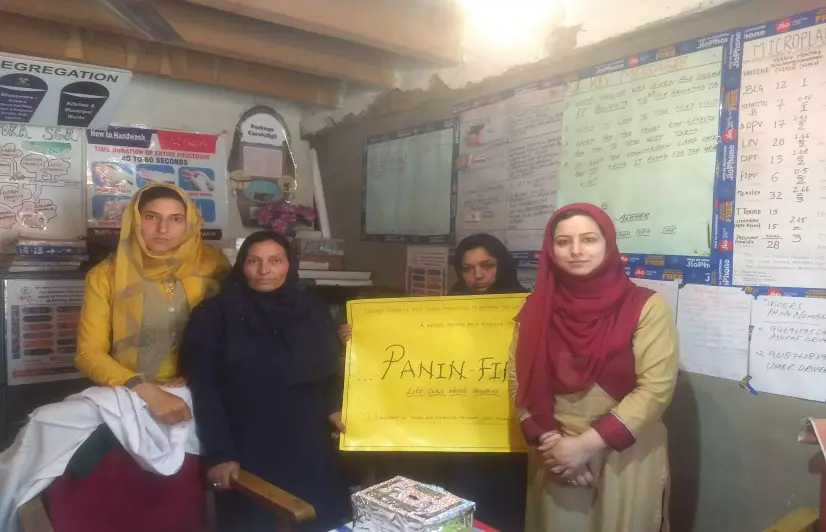Tackling misinformation around menstruation behind Kashmir’s closed doors

Tackling misinformation around menstruation behind Kashmir’s closed doors
Srinagar, Jammu and Kashmir: In the narrow decrepit lanes of Nandpora area in Saidakadal Srinagar, two girls with veiled faces walk in a secretive manner towards a health centre, which is housed in a two-roomed hut. They talk in whispers and seek directions to the place. A passerby points them in the direction of an old gate, which has worn out by the passage of time. It creaks loudly as it opens to a large group of women whose faces are equally covered. The veiled faces of these women are focused on a young female doctor, who is sitting in the middle, with rapt attention.
The doctor speaks in a quiet but confident tone asking questions on the group’s understanding of menstruation. “Do you get cramps and backache? Do you suffer silently or share the pain with someone? Do you still use a cloth when you bleed? Have you ever tried using a sanitary napkin,” she asks. Dr Auqfeen Nisar, 28, has taken upon herself to carry forward the mission of menstrual hygiene and create awareness among the women in the area. Dr Nisar is currently pursuing MD in Community Medicine at Government Medical College in Srinagar.
“My mother would not allow me to go out to school during periods. She would even tell me not to share about periods with anyone as it is a matter of shame and a big sin,” says 16-year-old Rehana (name changed).
She reveals that her mother would give her some old unclean pieces of cloth for her to use during her menstrual cycle. As a result, she developed urinary tract infection and was on medication for a month.
“My mother said that dirt should be treated with dirt,” she says.
Henna (name changed) in her early twenties stopped telling her mother about her period and goes to her maternal grandmother’s home during her menstrual cycle. “I silently endured the backache and hid the napkins in the innermost pocket of my bag or else all hell would break loose,” she says.
Surprised with discomfort and taboo on menstruation, Dr Nisar says that she was approached by an adolescent girl last year whose mother had claimed that sanitary pads lead to infertility.
Disturbed by these experiences, Dr Nisar, a resident of Lal Bazaar locality in old city Srinagar is determined to confront the issue. She is charting a silent revolution with her team by spearheading a campaign called ‘Panin Fikir’ (To take care of oneself) in the area.
“A woman takes care of everyone but forgets to care about her self. I want to ensure that women of this area should get over misconceptions about menstruation and start caring about themselves. Hence the name, Panin Fikr,” she says.
The project began in January 2019. Her team comprises of two nurses and four ASHAs (Accredited Social Health Activist) as staff at the sub-centre. The sub-centre caters to a population of around 4000 out of which 200 are adolescent women.
The ASHAs help in mobilising women, especially the antenatal females, for immunization, antenatal check-ups, and outdoor sessions. The team has conducted around 15 workshops in the area so far.
Adolescent females often come to her with many health-related issues (like itching, whitish discharge, reproductive tract infections) and it was found out that their menstrual hygiene is deplorable, reveals Dr Nisar.
She claims that the women often use cloth during their menstrual cycle, often repeatedly without washing it properly while only a marginal section use sanitary pads. Dr Nisar and her team began their research by finding the barriers and learnt that “affordability and lack of awareness” came as the biggest hurdles for women to practice menstrual hygiene.
As part of Panin Fikir, Dr Nisar and her team have short-listed two low-cost sanitary napkin companies. Each pack consisting of two napkins is sold at Rs 5. She says that here idea transformed into a result through crowd-funding. Acceptance of such a product was also a barrier, and Dr Nisar, distributed few packets for free initially and sought feedback on it.
Another challenge for Dr Nisar is sustenance. She feels that people resort to old ways once you stop providing the pads for free, which is why they provide sanitary napkins at subsidised rates. Dr Nisar and her team aim to bring a behavioural change through her workshops and awareness campaigns. “The cultural taboos and superstitions associated with periods have persisted at the cost of women’s health and safety. Someone has to come forward and bring a change. If not today, then when?” she adds.
Would you like to Support us
101 Stories Around The Web
Explore All NewsAbout the Reporter
Write For 101Reporters
Would you like to Support us
Follow Us On
